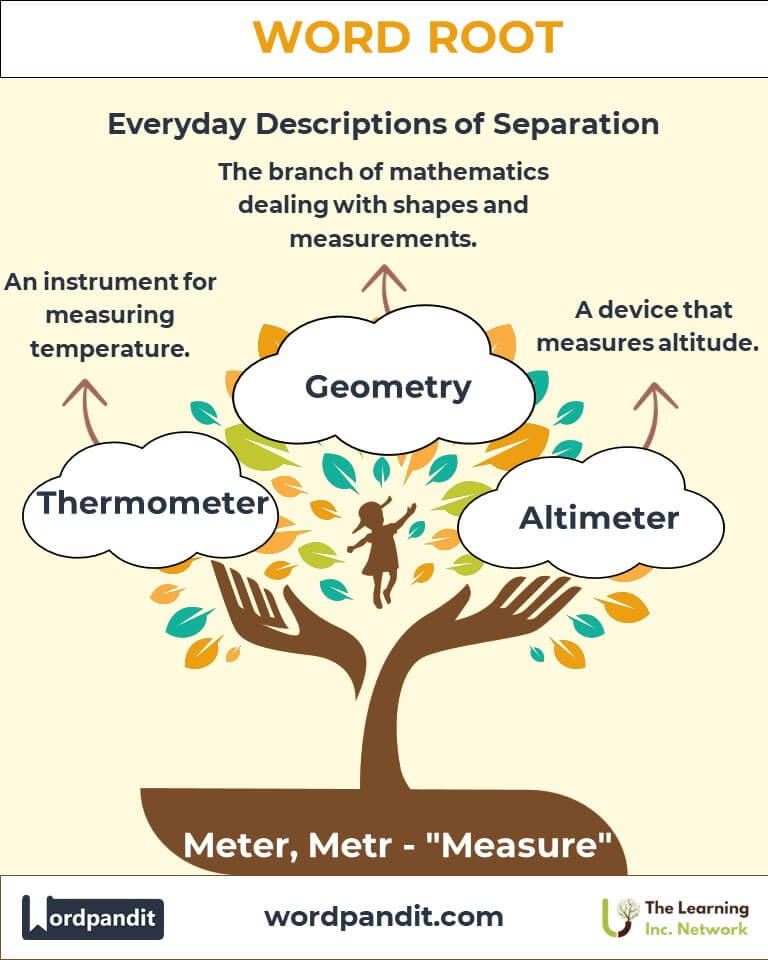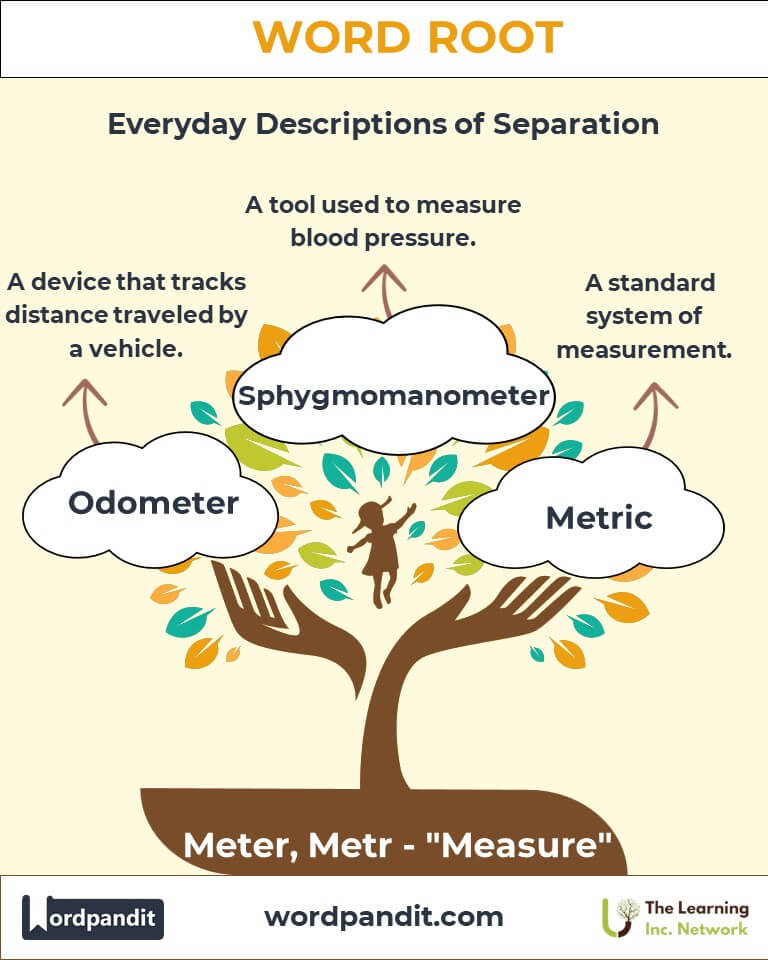Meter, Metr: The Measure of Precision and Progress
Discover how the roots "meter" and "metr," derived from Greek and Latin origins meaning "measure," shape modern vocabulary across science, art, and daily life. From instruments like the thermometer to systems like the metric scale, these roots exemplify the universal human quest for accuracy and balance.

Table of Contents
- Introduction: The Essence of "Meter, Metr"
- Etymology and Historical Journey
- Mnemonic: Unlocking the Power of "Meter, Metr"
- Common "Meter, Metr"-Related Terms
- "Meter, Metr" Through Time
- "Meter, Metr" in Specialized Fields
- Illustrative Story: "Meter, Metr" in Action
- Cultural Significance of the "Meter, Metr" Root
- The "Meter, Metr" Family Tree
- FAQs About the "Meter, Metr" Word Root
- Test Your Knowledge: "Meter, Metr" Mastery Quiz
- Conclusion: The Living Legacy of "Meter, Metr"
Introduction: The Essence of "Meter, Metr"
When was the last time you checked your thermometer or measured a recipe using the metric system? These everyday tools trace back to the linguistic roots "meter" and "metr," from the Greek "metron" (measure). Representing humanity's desire for precision and order, these roots underpin countless terms in language and science, from "geometry" to "altimeter."

Etymology and Historical Journey
The roots "meter" and "metr" stem from the Greek "metron," meaning "measure," and the Latin "metrum," used in poetry and rhythm. Initially, they referred to literal measurements of length, weight, or volume, later extending to abstract concepts like harmony and balance. Their influence spread during the scientific revolution, standardizing terms like "metric" and "thermometer."
Mnemonic: Unlocking the Power of "Meter, Metr"
Picture a ruler labeled "METR" with every line denoting precision. Imagine each measurement as an achievement of clarity, order, and balance.
Mnemonic: "Meter and metr bring measure to life, balancing science, art, and daily strife."
Common "Meter, Metr"-Related Terms
- Thermometer (ther-mom-uh-ter):
Definition: An instrument for measuring temperature.
Example: "The thermometer read 100°F, signaling a fever." - Geometry (jee-om-uh-tree):
Definition: The branch of mathematics concerning shapes, sizes, and properties of space.
Example: "Geometry helps architects design sturdy buildings." - Metric (me-trik):
Definition: A standard of measurement or system of metrics.
Example: "The metric system is widely used in scientific studies." - Altimeter (al-ti-mee-ter):
Definition: An instrument measuring altitude.
Example: "The pilot checked the altimeter to gauge the plane's height." - Odometer (oh-dom-uh-ter):
Definition: A device measuring distance traveled by a vehicle.
Example: "The odometer showed the car had traveled 120,000 miles."
"Meter, Metr" Through Time
- Metameter (Ancient): Referring to a poetic meter, used to structure verses in Greek and Roman literature.
- Metric System (Modern): Introduced during the French Revolution to simplify and standardize measurements globally.
"Meter, Metr" in Specialized Fields
- Medicine:
Sphygmomanometer: Measures blood pressure, essential for diagnosing hypertension. - Aviation:
Altimeter: Guides pilots during flights. - Technology:
Accelerometer: Measures the acceleration of a device, crucial in smartphones and fitness trackers. - Poetry:
Tetrameter: Describes lines of verse with four metrical feet, used in poetry for rhythm.
Illustrative Story: "Meter, Metr" in Action
Dr. Elena worked tirelessly to create an advanced thermometer for neonatal care. Her invention, precise to the millimeter, saved countless premature babies by ensuring optimal temperatures. Across the world, a mountaineer used an altimeter to scale Everest, relying on measurements to guide his way. Both stories highlight how "meter, metr" roots enable human endeavors.
Cultural Significance of the "Meter, Metr" Root
From ancient poetry to modern engineering, "meter" and "metr" have shaped civilizations. Poetic meters helped Greeks create timeless epics, while the metric system simplified trade and science. Their universality symbolizes the human quest for precision and order.

The "Meter, Metr" Family Tree
- -nomy/-logy (Greek, "law or study"):
- Astronomy: Study of celestial measurements.
- -scope (Greek, "to look"):
- Microscope: Instrument for examining small objects.
- -graph (Greek, "to write"):
- Autograph: Writing or signature of a person.

FAQs About the "Meter, Metr" Word Roots
Q: What do "meter" and "metr" mean?
A: "Meter" and "metr" both mean "measure." These roots come from the Greek word metron and the Latin word metrum. They form the foundation for terms related to measuring physical quantities, distances, and abstract patterns, making them essential in various fields like mathematics, poetry, and engineering.
Q: What is the metric system?
A: The metric system is a standardized measurement system based on powers of ten. It was introduced during the French Revolution to simplify and unify global measurements. Today, it is the international standard in science and commerce, using units like meters (length), liters (volume), and grams (mass).
Q: Is "meter" only used for distance?
A: No, "meter" is not limited to measuring distance. It also appears in instruments measuring temperature (thermometer), altitude (altimeter), speed (speedometer), or even rhythm in poetry and music (metronome). Its adaptability highlights its relevance in diverse disciplines.
Q: How do "meter" and "metr" appear in poetry?
A: In poetry, "meter" refers to the rhythmic structure of verses, defined by patterns of stressed and unstressed syllables. Examples include pentameter (five beats per line) and tetrameter (four beats per line). These patterns help create harmony and flow in poetic composition.
Q: What is an altimeter?
A: An altimeter is an instrument that measures altitude, the height above a given reference point (often sea level). It is crucial in aviation, where pilots use it to maintain safe flying heights, and in mountaineering, where climbers rely on it to track elevation.
Test Your Knowledge: Meter, Metr Mastery Quiz
1. What does "meter" mean?
2. Which instrument measures altitude?
3. What does "geometry" study?
4. What is the primary advantage of the metric system?
5. Which device measures distance traveled by a vehicle?
Conclusion: The Living Legacy of "Meter, Metr"
The roots "meter" and "metr" transcend disciplines, grounding humanity's pursuit of knowledge and precision. As our tools and understanding evolve, these linguistic pillars will continue to guide us, from the depths of the ocean to the heights of the cosmos. Let "meter" and "metr" inspire a deeper appreciation for the measurements that shape our world.












